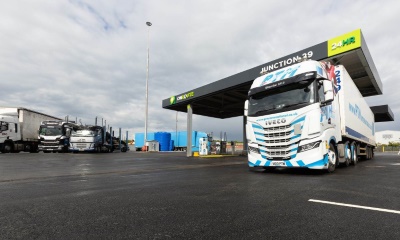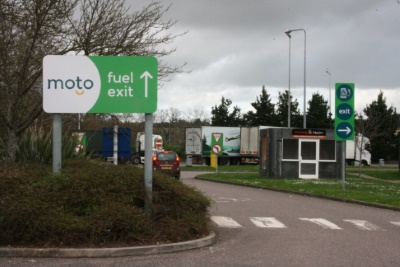RHA warning on cargo theft as truckstop funding announced

Onroute Truckstops’ Junction 29 site near Chesterfield is among the recipients of the funding. Image courtesy Onroute Truckstops
Efforts to improve truckstop provision in England took a further step forward last month with the announcement of a £16.5 million joint government and industry investment – but the funding comes amidst a continued shortage of secure overnight parking spaces for trucks and growing concern in the industry over cargo theft.
The second round of funding for improved truckstop facilities will see government money of £6 million being used to top up £10.5 million from the operators of truckstops and service areas to improve driver facilities at 38 sites.
The Department for Transport (DfT) claims the move will create around 430 new truck parking spaces, plus new showers and restaurants, and security fencing and lighting improvements. The funding will also support the installation of electric truck charging facilities and solar panels.
The investment is part of a wider HGV parking and driver welfare grant scheme, which also included a £15 million spend allocated in September 2023. The scheme is informed by the national lorry parking survey, which provides evidence as regards required improvements and in which areas more roadside infrastructure is needed.
Declan Pang, director of policy and public affairs at the Road Haulage Association (RHA), said: “We are delighted to see the government’s match funded grant scheme being awarded to projects which will make a tangible difference to the experiences of lorry drivers and provide much needed additional parking capacity to address the well-known shortage of spaces. We are pleased to see facilities operators contribute funding and commit to improving security and conditions at the sites they operate. We look forward to seeing the positive impact the funding will have across the range of projects.”
But while welcoming the latest round of funding, the RHA said that more work was needed on the simplification of planning rules to ensure that new facilities could be constructed more quickly; and the association also warned last month that the industry was still suffering from an estimated shortage of 11,000 parking spaces, leaving many drivers with no option but to park up on laybys and industrial estates where they are more vulnerable to attack.
“Understanding the full picture has been long hampered by there being no official freight crime recording category available to police,” said Ashton Cull, RHA policy manager.
“Fuel theft and cargo theft from trucks are reported under the catch-all ‘Theft from a motor vehicle’ which also records opportunistic volume crime such as a mobile phones or laptops stolen from a car.
“This means that, despite its highly organised nature, freight crime goes unseen and the impacts of it are not understood.”
Mr Cull contributed to a piece in the Times newspaper last month, which reported that high prices in shops was driving demand for black-market groceries as cost-of-living concerns continue, with organised gangs targeting cargoes such as high-value foods, alcohol and tobacco in ‘mafia-style lorry raids’.
“We know this is nothing new but it’s fair to say it largely flies under the radar in mainstream conversation despite the impact thefts from trucks has on businesses, consumers and more importantly on the victims out on the road – the truckers,” said Mr Cull.
Rhys Hacking, managing director of Direct Connect, an RHA member based in Bicester, Oxfordshire, told the newspaper that the company had experienced 80 attempted thefts over the past five years, with most occurring in what are considered secure parking areas, where CCTV and number-plate recognition technology was in operation. He said truckstops needed security guards on site as a deterrent to crime gangs.
Ashton Cull cited figures from the National Vehicle Crime Intelligence Service (NaVCIS), which reported more than 5,000 incidents of freight crime in 2022, with goods lost valued at almost £70 million – though taking into account VAT and market price, the actual loss would be far higher, he said.
“We believe it’s likely to get worse with millions struggling to make ends meet. The British Standards Institution says that 24 per cent of all thefts from lorries and warehouses last year were food and drink — up from 13 per cent of the total the previous year.”
He said cargo theft was “as bad as it’s ever been”, and highlighted a record number of insolvencies in the haulage sector in recent times and the consequences for wider society of higher retail prices.
“Criminal groups understand how supply chains work,” he warned.
“They know about drivers’ hours and the regular freight routes and stopping areas. It makes it easy to target trucks for their fuel or loads.”
The issue was having a knock-on effect on the recruitment and retention of drivers, he added.
“Many would-be truckers might think twice about coming into our industry when they see disturbing images of slashed curtains, and worse still reports of assaults. And what about for those already doing the job? The thought of parking up in isolated spots in the middle of nowhere can only exacerbate drivers’ feelings of anxiety, loneliness, and isolation.
“Providing more safe and secure truckstops, through reformed planning rules and a focus on the highest security standards across the board will help this situation, as will a review of sentencing guidelines so the impact of freight crime is properly considered – a deterrent for criminals and taking away their opportunities to act.”
In February, the RHA announced it would be leading a new government taskforce on roadside facilities, claiming that 62 per cent of HGV drivers were dissatisfied with both the quality and quantity of parking facilities available in the UK.
“For decades there’s been a severe shortage of safe, secure parking and welfare facilities available to truckers,” said the association.
“The taskforce will be a vital part of how we collaborate on bringing forward new lorry and coach parking to the areas most in need of additional parking capacity – working with industry and local government to attract investment and get planning approved swiftly.”
Announcing the latest round of truckstop funding, the roads minister, Guy Opperman, said: “Our lorry drivers are the backbone of a successful economy, ensuring food, goods and crucial medical supplies can get where they need to be, all over the country.
“That’s why it’s only right we leave no stone unturned when it comes to supporting our lorry drivers as part of our plan to grow the economy, and today’s £16.5 million in joint government and industry funding will provide them with the safe, spacious and modern facilities they deserve.”
Ron Perry, whose A19 sites in County Durham were among the beneficiaries of the funding, said: “The DfT welfare grant scheme goes a long way towards realising our ambitious project of delivering modern, secure and appealing facilities for lorry drivers to park overnight.
“Without the grant from the department, this project simply would not be viable for us. We very much look forward to delivering the improvements so that we can provide lorry drivers the fantastic facilities they deserve.”
A full list of sites benefiting from the scheme can be found at the gov.uk website.











